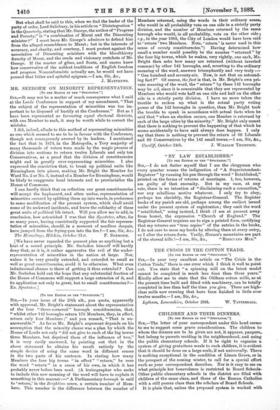[To THE EDITOR OF THE "SPECTATOR. "] SIR, —In your issue of
the 20th ult., you quote, apparently with approval, Mr. Bright's statement about the representation of the four "three-cornered" borough constituencies, that, "whilst other 142 boroughs return 176 Members, they, in effect, return only four Members ;" and you remark, "That is un- answerable." As far as Mr. Bright's argument depends on his assumption that the minority clause was a plan by which the House of Lords not only " did not give to each of the big towns three Members, but deprived them of the influence of two," it is very easily answered, by pointing out that in the above statement he obtains his result entirely by the simple device of using the same word in different senses in the two parts of his sentence. In stating how many Members the four big towns "in effect" "return," he uses the word " return " in a sense of his own, in which it has probably never before been used. (A lexicographer who seeks to include this new meaning of the word will have to explain it something in this manner :—" A Parliamentary borough is said to return,' in the Brightian sense, a certain number of Mem- bers. This number is the difference between the number of Members returned, using the words in their ordinary sense,. who would in all probability vote on one side in a strictly party division, and the number of Members returned by the same• borough who would, in all probability, vote on the other side e.g., in the year 1883, the City of London would have been said to return' two Members. Note, return' is never used in this= senseof county constituencies.") Having determined how- small a number could possibly be the number "returned" by the four big towns, which he makes, very rightly, one each, Mr. Bright then asks how many are returned (without inverted: commas) by other 142 boroughs, and, reverting to the ordinary meaning of the word, answers triumphantly and very truly :— " One hundred and seventy-six. Now, is not that an astound. ing fact P" Of course, the fact is that, in Mr. Bright's own pri- vate meaning of the word, the "return" by these 142 boroughs: may be nil, since it is conceivable that they are represented by Members who would vote half on one side and half on the other side in a strictly party division. I have no more taken the- trouble to reckon up what is the actual party voting- power of the 142 boroughs in question, than Mr. Bright took the trouble to speak in accordance with actual facts when he- said that " when an election occurs, one Member is returned by each of the large cities by the minority." Mr. Bright only meant that there is nothing to prevent the happening of that which he- seems accidentally to have said always does happen. I only say that there is nothing to prevent the return of 88 Liberals: and 88 Conservatives by the 142 small towns.—I am, Sir, &c.,.






































 Previous page
Previous page